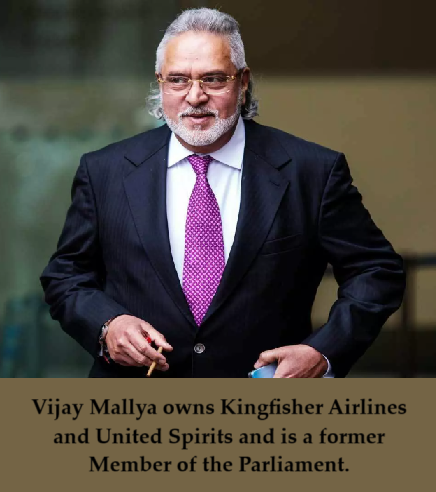Finance Minister Nirmala Sitharaman recently addressed the Lok Sabha regarding the Supplementary Demands for Grants. She stated that the Enforcement Directorate (ED) has recovered assets worth ₹17,750 crore in connection with various cases, including those of Vijay Mallya, Nirav Modi, and Mehul Choksi.
She also stated that the ED has restored properties worth Rs 22,280 crores to victims and rightful claimants, asserting that the fight against economic offenders will continue uninterrupted.
An overview of financial scams in India and the government's recovery methods is provided below

Vijay Mallya

Vijay Mallya is a prominent Indian businessman. He owns Kingfisher Airlines and United Spirits and is a former Member of the Parliament. He has also served as Chairman of Sanofi India and Bayer Crop Science.
He faced severe financial difficulties that ultimately led to the collapse of his empire, Kingfisher Airlines. He was implicated in financial misconduct and money laundering totalling approximately Rs. 9,000 crores. To support his airline venture, Mallya secured loans from 17 Indian banks.
Authorities claim that a substantial portion of the loaned funds was redirected to shell companies and overseas accounts instead of being used for the airline's operations.
This misappropriation of funds is a key element of the money laundering charges against Mallya. In March 2016, facing increasing legal pressures, Mallya left India for the United Kingdom. Following this, Indian authorities revoked his passport and began extradition proceedings to return him to face charges.
Indian banks have been working to recover outstanding debts. Recent reports indicate that public sector banks have recovered around ₹14,131.6 crore from the sale of Mallya's assets. In July 2024, the Securities and Exchange Board of India (SEBI) prohibited Mallya from trading in the securities market and from associating with any listed company for three years, further tightening the legal constraints around him. In December 2024, Finance Minister Nirmala Sitharaman announced that properties valued at Rs 14,131.6 crore, which belonged to fugitive Vijay Mallya, have been returned to public sector banks.
Nirav Modi & Mehul Choksi

Nirav Modi was an India-based jeweller involved in the business of diamonds and jewellery. Along with his uncle Mehul Choksi, he used to leverage companies to commit financial fraud, resulting in substantial losses for Punjab National Bank. Hence, it was popularly called as the PNB Scam.
This fraud primarily involved the misuse of Letters of Undertaking (LoUs), which are bank guarantees utilized for international trade. Between 2011 and 2018, Modi's companies acquired unauthorized Letters of Understanding from a Punjab National Bank branch in Mumbai without any adequate collateral. These Letters of Undertaking (LoUs) were then utilized to secure buyer's credit from overseas branches of various Indian banks.
The scam, which was revealed in early 2018, involved fraudulent transactions totalling approximately ₹10,000 crores. This made it one of the largest banking frauds in India's history.
Nirav Modi left India in early 2018. He was arrested in London in March 2019 and has been fighting extradition to India since then. As of December 2024, he remains in the UK, with ongoing legal proceedings.
In December 2024, Finance Minister Nirmala Sitharaman announced that the Enforcement Directorate had retrieved assets totalling ₹1,052.58 crore from Nirav Modi and subsequently returned the money to the banks.
In the Mehul Choksi case, properties worth Rs 2,565.90 crore have been attached and will be auctioned.
Other major financial scandals that disrupted the entire nation and cast doubt on systemic vulnerabilities, highlighting the need for improved regulatory measures:
Harshad Mehta Scam (1992)
Harshad Mehta orchestrated a scheme to manipulate the stock market by using fake bank receipts and channelling funds from banks to artificially raise stock prices. This scandal revealed vulnerabilities in both the banking and stock market systems, resulting in substantial reforms and the strengthening of SEBI as a regulatory authority.
A partial recovery was achieved by liquidating Mehta's assets, with the proceeds being distributed among banks and financial institutions. However, the estimated recovery fell significantly short of the total amount lost in the fraud.
Amount involved: Rs. 4,000 crores
Satyam Scam (2009)
Under the leadership of chairman Ramalinga Raju, Satyam Computers artificially inflated its revenue, profits, and assets to mislead investors. At that time, it was regarded as the largest corporate fraud in India, prompting the implementation of stricter corporate governance standards and reforms in auditing practices. Tech Mahindra acquired the company, successfully stabilizing its operations, while investors and stakeholders suffered substantial losses.
Amount involved: Rs. 7,136 crores
Ketan Parekh Scam (2001)
Ketan Parekh, a stockbroker, engaged in the manipulation of stock prices for certain companies, referred to as K-10 stocks, by utilizing funds borrowed from banks and financial institutions, including the Madhavpura Mercantile Cooperative Bank. This scandal resulted in more stringent regulations for stock trading and cooperative banking.
Certain funds were retrieved through the liquidation of assets, and Parekh was prohibited from trading in the Indian stock market.
Amount involved: Rs. 1,000 crores
Sahara Group Scam (2010)
The Sahara Group raised funds from small investors through optionally fully convertible debentures (OFCDs) without the necessary regulatory authorization. As a result, SEBI directed the company to refund the investors along with interest. This incident also led to an enhancement of SEBI's authority to monitor financial instruments and safeguard investor interests.
SEBI has been in the process of recovering funds from the Sahara Group to reimburse investors. However, according to recent reports, only a small portion of the total amount has been returned so far.
Amount involved: Rs. 24,000 crores
Saradha Chit Fund Scam (2013)
The Saradha Group operated a Ponzi scheme, soliciting funds from investors by guaranteeing substantial returns. This situation underscored the necessity for stricter regulation of chit funds and similar schemes.
The recovery has been minimal, leaving many investors with financial losses. While properties belonging to the Saradha Group were confiscated and auctioned, the funds generated from these actions were inadequate.
Amount involved: Rs. 2,460 crores
Coal Allocation Scam (Coalgate) (2012)
Accusations regarding the improper allocation of coal blocks and lack of a transparent auction process led to policy reforms, including the implementation of competitive bidding for natural resources.
The cancellation of irregular coal block allocations, followed by their re-auctioning, generated significant revenue for the government.
Amount involved: Rs. 1.86 lakh crores
PMC Bank Scam (2019)
Punjab & Maharashtra Cooperative Bank extended loans to Housing Development and Infrastructure Limited (HDIL) that exceeded the allowed limit and concealed this exposure from regulatory authorities, prompting reforms in cooperative banking regulations.
The sale of HDIL's assets resulted in only a limited recovery. To protect the interests of depositors, the RBI implemented stringent banking restrictions.
Amount involved: Rs. 4,355 crores
DHFL Scam (2019)
Dewan Housing Finance Corporation Ltd. (DHFL) faced allegations of rerouting funds to shell companies and misappropriating money designated for legitimate housing loans. This has led to heightened scrutiny of the financial regulation of Non-Banking Financial Companies (NBFCs).
A portion of the funds has been retrieved through the sale of DHFL to the Piramal Group, while investigations and asset seizures are still in progress.
Amount involved: Rs. 34,615 crores
These scams underscore the importance of having transparent systems, strong regulations, and thorough oversight to combat financial fraud. Being vigilant about such scams is crucial for protecting oneself from falling victim. One can safeguard by being cautious of investment opportunities that appear too good to be true, conducting research on companies and individuals prior to investing, and reporting any questionable activities to the authorities









 CAclubindia
CAclubindia
